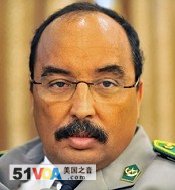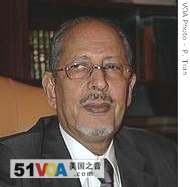Dakar
06 February 2009
 |
| General Mohamed Ould Abdel Aziz (file photo) |
The African Union's Peace and Security Council wants all member states to enforce an immediate travel ban on civilian and military members of the government in Nouakchott.
The AU blocked members of Mauritania's military government from attending this week's summit in Ethiopia, and again called for a quick resolution of the country's political crisis.
The sanctions come after military leader General Mohamed Ould Abdel Aziz ignored the African Union's October deadline to reinstate toppled President Sidi Ould Cheikh Abdallahi.
General Aziz says that would not serve the greater interests of the Mauritanian people. So he is planning new elections in June and changes to the constitution to allow soldiers to run for office. General Aziz says that reflects what he calls Mauritania's "new political and cultural reality." He is widely expected to run for president in June, but has not publicly announced his candidacy.
African leaders are not refusing to negotiate with General Aziz. The AU says its sanctions should be accompanied by African and international efforts to work with all Mauritanian parties toward the rapid return to constitutional order.
 |
| Sidi Ould Cheikh Abdallahi (file photo) |
Ahmed Ould Sanbe, the spokesman for deposed President Abdallahi, says the sanctions were inevitable once the military refused to yield power. He says the civilian opposition regrets the AU action because it could lead to a tougher international embargo that would hurt the Mauritanian people, especially as African leaders say they will pass on their decision to the United Nations.
There has been no official government response to the AU sanctions.
Local media report members of the ruling military council have told regional meetings that the government does not fear international sanctions because Mauritania has enough financial resources to develop its infrastructure without outside help.
Former-colonial-power France and the World Bank suspended most of their assistance following the coup. The United States is blocking $15 million in military cooperation, more than $4 million in peacekeeping training, and $3 million in development assistance.
The U.S. State Department says attempts to silence former President Abdallahi and the military's plans to hold unconstitutional elections in June violate democratic norms.